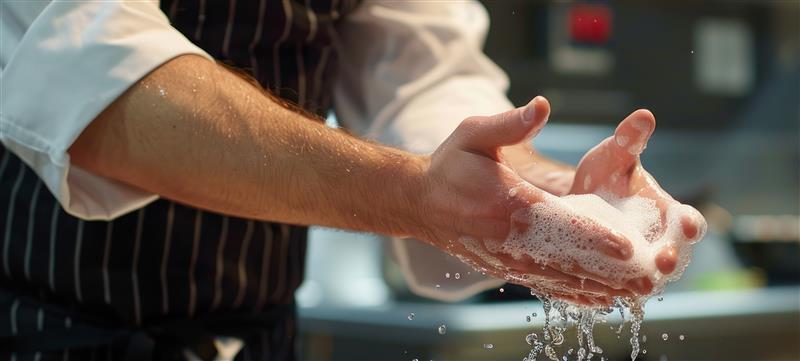When setting-up or running up your own artisanal food or drink business there’s more to think about than just producing great goods and getting them into the hands of the consumer. The food and drink manufacturing industry is a complicated one, where there is much to learn and a lot of preparation required – especially when it comes to food safety.
As one of the most heavily regulated and carefully monitored industries in the UK, the food industry is subject to more stringent hygiene and health and safety legislation than most sectors. When running up your own artisan food or drink production business it is essential that these rules and regulations are thoroughly researched and understood.
Before your first batch of products hit the production line, there are a few important things that you need to consider:
Local regulators
There are a number of local regulators that you should be in touch with as they can be a great source of guidance, for example, your local Trading Standards Officer can provide labelling and legal advice.
Premises
Choosing the right premises for your business is extremely important. There are regulations that your premises must comply with to allow you to prepare food safely. Areas you must consider include how you manage food preparation areas, equipment and food waste.
You must also meet the requirements for fire safety and health and safety in the workplace.
Local Authority
Food businesses need to register all their premises with the local authority 28 days before opening. Even if you’re not setting up a new premises and are merely taking over an existing one, you still need to let the council know about the change of ownership.
Legislation and regulations
The following regulations relating to food preparation are the most important and set out the required basic requirements for all aspects of a food production business:
- The Food Safety Act 1990
- Regulation (EC) No. 852/2004 on the hygiene of foodstuffs
- The Food Hygiene (England) Regulations 2006 (there are equivalent regulations for Scotland, Wales and Northern Ireland)
- Dependent on the nature of your operation and the food you are manufacturing, there might also be very specific legislation relating to your business.
Food safety management procedures
As a food manufacturer, you are also legally required to put in place and have a written record of your ‘food safety management procedure’, which must show that you’re complying with food hygiene requirements. As part of this procedure, you must:
- Keep the food safety management procedurein place, permanently
- Keep up-to-date documents relating to the procedure
- Review and update all procedures if you change how you work or the food you are producing
There are also different regulations that apply to different sectors within the food production industry. Those businesses dealing with meat production will be bound by different rules to those in the dairy sector. Your local authority should be able to tell you what applies to your business when you register your premises. More detail on these regulations can be obtained from the Food Standards Agency (FSA), which has produced a series of documents and guides for food businesses.
Your food safety management procedures must be based on the principles of Hazard Analysis and Critical Control Point (HACCP).
Hazard Analysis and Critical Control Point (HACCP)
HACCP is a system that identifies potential food hazards and introduces procedures to make sure those hazards are removed or reduced to an acceptable level. The procedures will help you to produce and sell food that is safe, providing that you keep any documentation and records, relating to your procedures, up-to-date and that you regularly review your procedures to ensure they reflect what you produce or how you work. The FSA provides information packs for small businesses to help them put the right food safety management procedures in place and these are worth checking out.
Be ready right from the off
One of the most common reasons people are prosecuted in relation to food safety is for not keeping their premises clean and in a state of good repair. This means that as soon as you start operating, your premises have to be up to the right standards and maintained at this level because the environmental health authority could carry out an inspection at any time. Having a safety-first approach / culture will ensure that you stay on top of this.
Staying up to date
Keeping on top of the latest legislation can be challenging but if you start to incorporate it as part of your weekly or daily routine, then this can help. Working with a safety consultancy that specialises in food safety can also help you stay on top of any changes, save you time and provide greater clarity around the rules.
Audits
Food safety audits are important tools in maintaining food safety standards and demonstrating how safe your products are for any relevant certification. They create transparency and reassure both consumers and regulators that the necessary standards are being maintained.
Embrace technology
The maintenance of food safety checklists and quality assurance documents requires the management of large amounts of data. A convenient safety checks app that assists with the management of the documents and workflows involved in your safety process can not only improve daily business operations but also save you time and hassle. Risk management software or platforms can also assist with processes that include management and archiving of training and certification records, statistics, and data collection and analysis.
Get to know your hazards
Every food business will have their own unique hazards. It is essential to get to know all of the risks in your organisation and how to control them. For this, training in HACCP is critical, so you know what to look out for. Secondly, it is useful to have a fresh pair of eyes, such as a safety consultant to review your production line and processes just in case there is a hazard you have missed.
Traceability
Food manufacturersmust also be able to demonstrate traceability – where they buy and supply food or food ingredients from. If there is a food incident and there are concerns about actual or suspected threats to the safety, quality or integrity of food, then you must immediately tell your local authority. If this is the case, you may also need to withdraw or recall your products.
Due diligence
As the owner of a food production business, it is your responsibility to undertake due diligence on the ingredients you use to make sure it is both safe and hygienic, even before it reaches your premises. This involves choosing trustworthy and reliable suppliers and asking the right questions of them to avoid problems along the chain of supply. Ultimately you have to be satisfied with all aspects of what you’re buying.
Food safety help & advice
Getting to grips with the rules and navigating the changes to legislation can be both overwhelming and time consuming, which is often where a food safety consultancy can help to alleviate the burden. By working with a specialist safety consultancy, you can get the benefit of their wealth of experience, as well as ensure that your audits and procedures are written in-line with the most up-to-date legislation and best practice. They can also provide you with a detailed action plan to aid you in making any necessary improvements, saving you time that can be used to keep your focus on the delivery of your end product.
Training
Businesses in the manufacturing industry have to take many precautions to satisfy food health and safety requirements. It is important that as a food business owner or manager, you have had suitable training in food safety and hygiene. However, safety is a role for your whole team and it’s your responsibility to make sure your staff receive suitable and sufficient hygiene training and are adequately trained to operate any piece of equipment they deal with safely.
When running a food production business, safety must be a key component of everything you do and not just a reactive process when it is time for an inspection – the onus is on you to be proactive on top of your due diligence year round. However, while food safety is important, it shouldn’t be something to fear. Legislation, guidance, audits and inspections exist to help your business and by implementing the necessary checks, these measures can help to improve your standards. This will only strengthen your brand reputation as they provide a comprehensive overview of your company’s compliance and approach to safety, which ultimately ensures that your products are produced in and remain in a fully saleable condition.
Useful contacts for a food production business
- Food Standards Agency
- Health and Safety Executive
- Food and Drink Federation
- Processing and Packaging Machinery Association
- The Manufacturers’ Organisation
- Department for Business, Innovation & Skills
- Shield Safety Group
Dependent on the nature of your operation and the food you are manufacturing, there might also be very specific legislation relating to your business.



